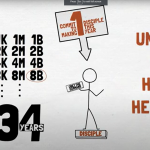
Last week’s item about, ” Acquiring All Spoken Languages Should be Equally Hard,” has sparked quite a debate. See it all at…
https://brigada.org/2018/09/09_24530
Several respondents have chimed in with experiential or anecdotal evidence. To date, however (check to see if we’re right), we haven’t seen one scientific study proving or disproving the theory that, since all babies seem to learn their first language in roughly the same period of time, it makes sense to postulate that learning any spoken language should/could conceivably be equally hard — and equally easy. This has huge implications for those who previously would have shied away from deploying, for instance, to Arabic-speaking lands. They’ve heard all the horror stories — so they opt for a Spanish-speaking land instead (since they’ve heard Spanish is “easier”). Our theory — and so far, we’re sticking with it, is that Spanish is indeed equally easy AND equally hard to speak correctly. It’s all the same as Arabic, Russian, Chinese, or any other global language when it comes to learning the aural-oral communication skills. (We’re not suggesting that learning any *written* language is equal. It takes Chinese children longer to learn to read and write Chinese too! : ) ) Our theory is based on the simple scientific fact that — learning to memorize a spoken phrase of mumbo-jumbo (and learning it well) is difficult for all of us. But for someone trained in acquiring aural-oral language, it’s of equal challenge no matter what language is being considered. What do we mean by someone trained in language acquisition? We mean, for example, that the learner has had significant training in phonetics so they can recognize subtle differences in pronunciation and tone. They have practiced hearing and *producing* those subtle differences. They know how to diagram and jot down their experiences in a log book. They have learned how to listen — and they have special skills in practicing and producing the language exactly like they are hearing it. Such a person is no longer trapped in legends like, “Only those with a gift in music can learn tones,” because of his or her special training.
Now these are our theories — but we have yet to see a single scientific study disproving the notion. And all our common sense verifies our theory (including the positive proof that all babies, with no training at all, end up speaking their heart language around the same time). Again, to us, this is a tremendous boost to mobilization to the tough languages of the world. AND it’s also verification that we ought to make sure our language learners are getting good training in language acquisition techniques.
Your thoughts? Can you point us to any scientific studies disproving out theory? Just click “Comment” following the web or app version of the original item at…
https://brigada.org/2018/09/09_24530
(Please comment there rather than here so the thread can stay intact.)











It seems like the comment made by Mike on the previous post addresses the “babies learn the same” idea.
“A study presented at the 10th Congress of the ‘International Association for the Study of Child Language’ in Berlin reports that Turkish children learn to speak their native language grammatically at the earliest age of any group studied. The nearly 800 linguists in attendance were informed that Turkish children learn to speak grammatically correct Turkish by the time they are 2 to 3 years old, while, for example it takes German children until they are 4 to 5 years old and Arab children until they are around 12 years old.”
We have seen times where Bible translators have lived among people using tone and have had to ask to be reassigned since they can’t seem to “hear” the tone. Of course they hear it but dont distinguish it well. That’s okay! They are then moved to another (non-tonal) language and do fine.
I am not sure what they would do with this statement…..
Such a person is no longer trapped in legends like, “Only those with a gift in music can learn tones,” because of his or her special training.
From my example on the other page. Imagine an American person being told to learn the phrase “this is the man” in several languages.
He hears:
“dit is de man” in Dutch (which includes no sounds he does not already know) (only aspiration difference)
Then….
tämä on mies (Finnish)
đây là một người đàn ông (with tone) (Vietnamese)
Zhè shì nánrén (with tone) (Chinese)
Lo ngumntu (with tone, click, and implosive) Xhosa
These other languages would include sounds he has never heard before in his life, and certainly never produced with this tongue/mouth muscles.
He has to learn to “hear” the sounds and train his tongue to make the sounds. And in fact he may think he is doing this well, but might (per my previous Chinese example) accidentally call his mother-in-law a horse.
On the previous page Noah said, “You have asked for proof: please visit https://www.state.gov/m/fsi/sls/c78549.htm to see how the US State department has ranked languages based on their experience of how long” it takes Americans to learn.
Certainly the difference in script (reading) plays into this…. but not completely. There are level II and level III languages that use Latin script and are still assessed as taking longer (for native English speakers!).
I think it’s dangerous to equate L1 learning (first language) learning with L2 (additional language) learning. You will find many articles that highlight the vast differences between babies learning a L1 and children or adults learning an L2, even for only spoken language. First language learning shapes how our brains acknowledge language patterns, and this creates positive or negative transfer as L2 learning develops. Again, even if only focused on oral/aural language.
I don’t agree that all languages are equally easy or hard to learn. I’ve just skimmed the comments on this article and the previous one but I didn’t notice anyone talking about the role of memory and discriminating hearing (in anything other than tone).
My husband’s first language is an indigenous language in Mexico (unwritten until the late 1980s). His second language is Spanish which he learned by going to public school; he’s often taken for a native Spanish speaker. English is his third language with a BA in Teaching English as a Foreign Language, has his MA and is working on his PhD.
My first language is English; I studied Spanish in high school and college but couldn’t speak comfortably until I was living in Mexico. I have learned Hubby’s first language but wish I could speak it HALF as well as he speaks English.
The differences I see between our abilities have to do with
1. memory (he has a phenomenal memory; I struggle to memorize anything especially if I can’t see it.)
2. discriminatory hearing: he can hear so many differences in things that I don’t (tones, phonetic sounds, music, etc.)
3. modes of learning: he is an auditory learner and I am a visual learner. I can read and understand his first language very well but hearing and speaking it are very difficult for me.
Yes, we probably each learned and spoke our mother tongues at about the same and appropriate ages but acquiring more languages is not at all the same as learning your first language. (I like what someone above commented about having to unlearn first language patterns when learning another language.)
You said,”
To date, however (check to see if we’re right), we haven’t seen one scientific study proving or disproving the theory that, since all babies seem to learn their first language in roughly the same period of time, it makes sense to postulate that learning any spoken language should/could conceivably be equally hard — and equally easy. ”
Several articles are listed on the post of the previous week. Besides….needing that exact study to prove a negative?
Anyway, the state dept gives longer time for US English speakers to learn certain languages (that even share the same Latin alphabet–so it is not “about reading”). That alone would demonstrate that —over time— they have learned that some languages are harder for first-language English speakers to learn than others.
The example you gave in the previous post:
“This is my third day in your country,” comes out like this in Dutch..
Dit is mijn derde dag in jouw land..
And sounds very close.
This is what it looks and sounds like in Georgian:
ეს ჩემი მესამე დღეა თქვენს ქვეყანაში
es chemi mesame dghea tkvens kveq’anashi
Bizarre script aside even the audible part is completely different than English with no shared cognates….and several sounds we do not make in English (and that are hard to reproduce).
You want to say that memorizing a mumbo-jumbo phrase is the same anywhere, but that is just not true cuz you say so.
In the example above a person might learn that “is” in Dutch means “is (In English) and “land” means country. He has done more than learn a phrase. He discovered that his language and English share cognates (Dutch and English share tons!). There are almost no shared cognates with Georgian, requiring a person to not only start from scratch, but produces many sounds that we do not have.
And of course that speaks noting of syntax. Dutch is S-V-O like English and to quote the wiki page….uh…Georgian is not!
“Georgian is a left-branching language, in which adjectives precede nouns, possessors precede possessions, objects normally precede verbs, and postpositions are used instead of prepositions.”